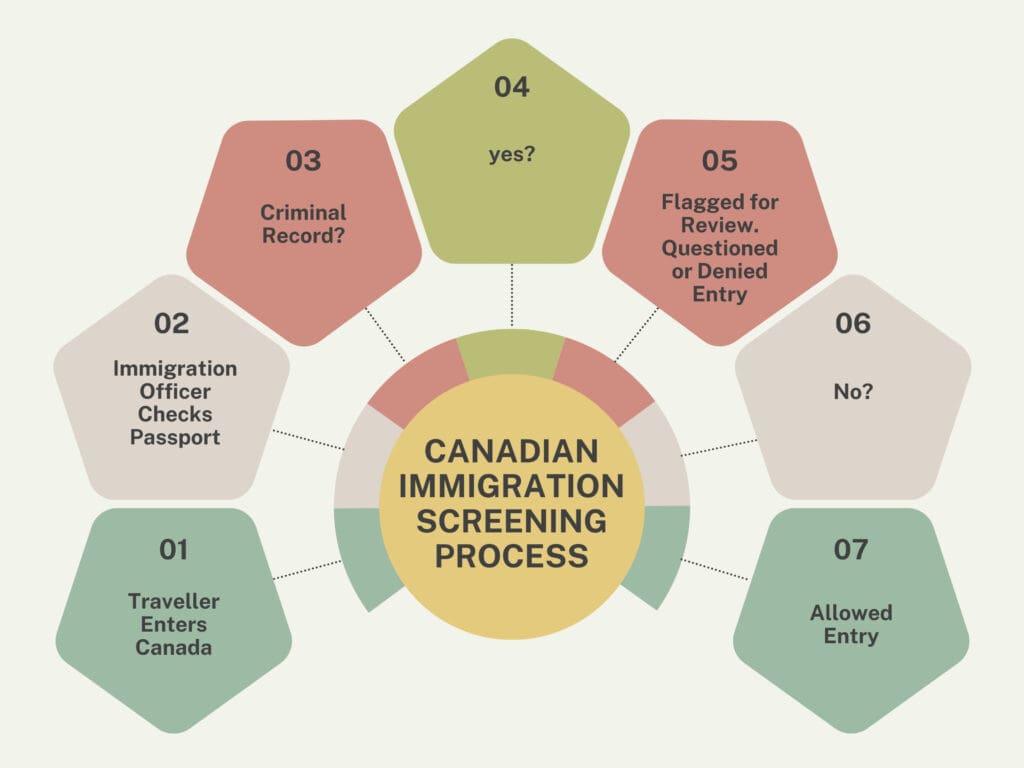
Entering Canada with a criminal record can present significant challenges. Canadian immigration authorities enforce strict rules to ensure public safety, denying entry to those deemed inadmissible based on criminal history. This guide provides a detailed overview of criminal inadmissibility in Canada and the steps individuals can take to overcome these obstacles, facilitating their path to travel or immigration.
Understanding Criminal Inadmissibility
Criminal inadmissibility refers to the legal status that prevents an individual from entering or remaining in Canada due to past criminal activities. Canadian immigration authorities assess inadmissibility based on various factors, including the nature of the offense, its equivalent under Canadian law, and the time since the conviction.
Types of Offenses and Their Impact
Canada classifies offenses under three main categories, each influencing admissibility differently:
- Summary Offenses
These are minor offenses similar to misdemeanors in other jurisdictions. Examples include public disturbances, minor thefts, and loitering. Individuals with a single summary offense are often still admissible to Canada, provided the crime does not indicate a broader pattern of criminal behavior. - Indictable Offenses
More serious in nature, these offenses are comparable to felonies and include crimes such as assault, drug trafficking, and robbery. Indictable offenses may lead to inadmissibility depending on the severity and the length of the sentence imposed. Crimes punishable by a maximum term of 10 years or more in prison are categorized under serious criminality, making it significantly harder to gain entry to Canada. - Hybrid Offenses
These offenses can be prosecuted either as summary or indictable offenses. Examples include impaired driving and fraud. For immigration purposes, hybrid offenses are treated as indictable offenses, potentially leading to inadmissibility if the maximum penalty in Canada exceeds 10 years.
Key Factors Considered by Canadian Authorities
When determining criminal inadmissibility, Canadian officials evaluate the following aspects:
- Severity of the Offense: Authorities assess whether the crime is categorized as summary, indictable, or hybrid, and the associated penalties under Canadian law.
- Sentence Imposed: The nature of the punishment, including imprisonment, fines, or community service, impacts admissibility.
- Time Since Conviction: The length of time that has passed since the sentence was completed is critical. For some offenses, time can influence eligibility for rehabilitation or deemed rehabilitation.
How to Determine Your Admissibility Status
Determining your admissibility requires comparing your foreign offense to its Canadian equivalent. The Criminal Code of Canada serves as the primary reference for this comparison, categorizing offenses as summary or indictable. If you are unsure about the legal parallels between your offense and Canadian law, seeking the advice of an immigration lawyer is highly recommended.
Options for Overcoming Criminal Inadmissibility
Several pathways are available to those who wish to enter Canada but face criminal inadmissibility. The approach taken depends on the severity of the offense and how much time has passed since the sentence was completed.
1. Applying for a Temporary Resident Permit (TRP)
A Temporary Resident Permit (TRP) is a document that allows individuals deemed inadmissible to enter Canada for a specific purpose and limited duration. This permit is ideal for those with a pressing reason to visit Canada, such as business or family matters, that outweighs the risk posed by their criminal history.
To obtain a TRP, applicants must demonstrate that their presence in Canada benefits the public or fulfills a significant need. TRPs are granted at the discretion of immigration officials and can be issued for up to three years.
2. Eligibility for Deemed Rehabilitation
Deemed rehabilitation is an automatic status granted to individuals whose offenses are considered less severe and who meet specific criteria. Typically, deemed rehabilitation applies to individuals who:
- Have a single summary offense on their record.
- Have completed their sentence at least five years ago.
- Have not committed any further crimes.
Deemed rehabilitation is a straightforward process as it does not require an application. However, if you are unsure of your eligibility, consulting an immigration lawyer for a legal opinion letter can clarify your status before attempting to enter Canada.
3. Applying for Criminal Rehabilitation
For more serious offenses, individuals may need to apply for criminal rehabilitation, which permanently resolves inadmissibility. Applicants must wait at least five years after completing their sentence before applying. Criminal rehabilitation is a comprehensive process that requires a thorough review by Canadian immigration authorities.
Once granted, criminal rehabilitation allows individuals to enter Canada without facing further legal barriers. This process can take over a year, so individuals should apply well in advance of any planned travel.
4. Obtaining a Legal Opinion Letter
A legal opinion letter is a document written by a Canadian immigration lawyer that provides an expert interpretation of how a foreign offense aligns with Canadian law. This letter can be useful in cases where criminal inadmissibility is uncertain or where individuals need to clarify their status to border officials. It is particularly valuable for those with complex criminal histories or pending charges.
Criminal Records and Canadian Immigration Screening
Canada has access to international criminal databases, particularly in cooperation with the United States. Upon entry into Canada, immigration officials can access your criminal history through travel documents and may deny entry if they detect any inadmissible offenses. Additionally, visa and eTA applicants must disclose any criminal history during the application process.
Canadian Immigration Screening Process

This diagram illustrates the steps in the Canadian immigration screening process when a traveller enters Canada, emphasizing the critical role of background checks.
Police Certificates for Permanent Residency and Temporary Visas
For those applying for permanent residence, disclosing criminal history is mandatory. Police certificates from all countries where the individual has lived for six consecutive months since the age of 18 must be submitted. The same applies to temporary residents, such as foreign workers or students, depending on their country of origin.
Permanent Residents and Criminal Inadmissibility
While foreign nationals can be deemed inadmissible on both regular and serious criminality, permanent residents face inadmissibility only on grounds of serious criminality. For example, a permanent resident convicted of theft over $5,000 CAD or impaired driving after December 2018 may risk losing their status in Canada.
Other Reasons for Inadmissibility
Criminal records are not the only grounds for inadmissibility. Individuals may also be denied entry or immigration to Canada for:
- National Security Concerns
- Human Rights Violations
- Sanctions
- Medical Inadmissibility
- Financial Inadmissibility
- Misrepresentation (which results in a five-year entry ban)
It is essential to provide complete and accurate information in all immigration documents and interviews to avoid being barred from entering Canada.
By following the appropriate steps and ensuring all legal requirements are met, individuals with a criminal record can still explore opportunities to enter or immigrate to Canada. For complex cases, consulting with an immigration lawyer is highly recommended to ensure that all legal pathways are fully understood and utilized.
Don’t hesitate to reach out us AsKubeir for expert guidance and personalized support. Let us help you turn your career goals into reality and start your new chapter in Canada with confidence!
CONTACT US!
📞 Call us: 04 526 4646
📲 WhatsApp: wa.me/971529693030
🌐 Website: www.askkubeir.ae





